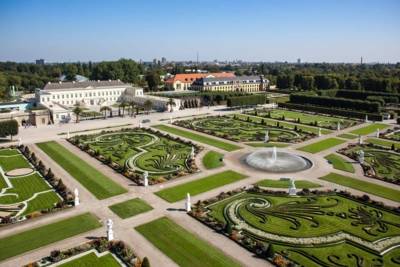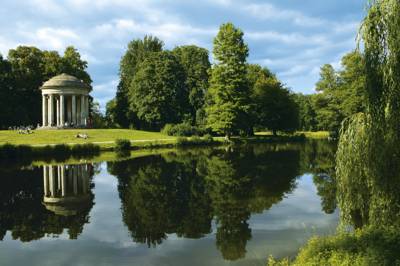Press Information
Walk in the footsteps of the Guelph royal family!
Here you can find and download press information.
Hannover's Royal Gardens of Herrenhausen
The Great Garden is one of the most important baroque gardens in Europe, captivating tourists from all over the world. The main attraction here is the recently rebuilt Herrenhausen Palace, home to the new Herrenhausen Palace Museum. The Garden itself presents a dazzling array of romantic fountains, exotic plants and striking sculptures. Events such as the international fireworks competition and the Small Festival in the Great Garden regularly attract large numbers of visitors.
The Royal Gardens of Herrenhausen are Hannover's most famous attraction, a reflection of aristocratic savoir-vivre for more than 300 years. The centrepiece is the 17th-century Great Garden, one of the best-preserved baroque gardens in Europe. Be sure to visit Herrenhausen Palace there. Rebuilt to its original splendour and boasting cutting-edge, multimedia facilities, the palace now hosts more than 160 events every year as a scientific venue and innovation hotspot for the whole of Lower Saxony – very much in the tradition of a famous former resident: the universal scholar Gottfried Wilhelm Leibniz.

For press purposes:image in printable resolution (300dpi)Copyright: Coptograph
The Great Garden is a place to lose oneself in, to marvel at the magnificent Great Fountain, which is 82m high (the largest of its type in Europe) and the Grand Cascade, to be enchanted by artist Niki de Saint Phalle's magically decorated grotto. And during the annual international firework competition, to watch transfixed as world-class pyrotechnics transform the sky above into a dazzling sea of trailing sparks. The Royal Gardens of Herrenhausen provide the atmospheric backdrop for a variety of unforgettable events and festivals throughout the year, including the KunstFestSpiele Herrenhausen arts festival, musical and theatrical performances in the Garden Theatre, the Small Festival in the Great Garden (with over 100 acrobats, mime artists and musicians), and various gala concerts and winter variety shows in the gallery and orangery buildings. Completing the ensemble of gardens is the idyllic Georgengarten (in the style of an English landscaped garden), the tree-lined Herrenhäuser Allee and the Berggarten, with its 12,000 plants and its display houses.

For press purposes: image in printable resolution (300dpi)Copyright: EAC GmbH
Marienburg Castle
When King George V of Hannover made a gift of Marienburg Castle to his darling wife, he could not have foreseen that his token of love would one day be celebrated as one of Germany's most impressive neo-Gothic monuments. With its fairytale appearance, host of battlements and turrets and magnificently furnished rooms, the castle enchants visitors or all ages.
It was the last summer residence of the Guelph Kings of Hannover and can be seen from as far off as Calenberger Land. The splendid neo-gothic palace was built by King George V in the mid-19th century as a gift to his wife Mary. Guided tours offer a fascinating glimpse of life behind the scenes. In summer, the Castle is used as a venue for live music and plays. The old coach house and stables provide a special ambience for the restaurant.
The History of Hannover
Heyday as royal residence, electorate and royal seat of the Guelphs
In 1636, in the midst of the 30 Years War, Duke George of Calenberg made Hannover a royal seat in order to regain the territory he had conquered as a general for the Guelph dynasty. George of Calenberg was followed on the throne of the principality by his four sons. Although Hannover had to surrender various privileges because of its annexation to the Principality of Calenberg, the town flourished as never before: in 1666, for example, George’s 3rd son, Duke John Frederick of Brunswick-Calenberg, began work on the Great Garden and the construction of Herrenhausen Palace as the summer residence of the Guelphs. He also summoned one of the most important philosophers of the 17th/18th centuries to the court and this was where Gottfried Wilhelm Leibniz (1646-1716) developed his visionary ideas. The privy councillor and librarian, mathematician and philosopher lived in Hannover from 1676 to 1714. George’s 4th son, Ernest Augustus (1629-1698), was crowned Elector in 1692 and transformed the Hanoverian court into one of the most sumptuous in Germany. His wife, Electress Sophia of the Palatinate, appreciated pomp and ceremony and cultivated intellectual life at the court. She devoted her life to the Great Garden, which was substantially enlarged and redesigned in the Dutch baroque style. The role of electorate also gave Hannover political weight in the country, attracting visits from famous names from Germany and abroad such as Georg Frideric Handel, who was appointed Capellmeister at the court of Ernest Augustus’s son Elector George Louis in 1710. The rank of electorate combined with Sophia’s claim to the English throne (Sophia’s mother was the English princess Elizabeth Stuart) provided Hannover with unprecedented opportunities to shape the history of Europe.

Download: printable resolution (300dpi)Copyright: HMTG
123 years of Personal Union: British Royals from Hannover (1714-1837)
Electress Sophia, the designated heir to the throne, died in 1714, and the British Queen Anne shortly afterwards. According to the Act of Settlement, the throne then passed to Sophia’s son, Elector George Louis of Hannover: he was crowned George I of Great Britain in 1714, marking the start of the Personal Union between Hannover and the Kingdom of Great Britain which was to last for 123 years. George I moved his court to London and ruled over the electorate from there. Hannover, which depended on the court, and the gardens in Herrenhausen were neglected and were left to slumber unattended for decades. However, it was thanks to this that Herrenhausen retained its unspoilt character, because other baroque gardens of the day were converted to conform to the contemporary ideals of English landscape gardening. The Electoral House of Hannover (and simultaneously Royal House as from 1814) reigned over Great Britain in Personal Union for five generations until 1837: under the Hanoverian law of succession, Victoria, Queen of Great Britain and niece of William IV, could not become Queen of Hannover. Instead, her uncle, the Duke of Cumberland acceded to the throne at the age of 66 as Ernest Augustus I, King of Hannover and Duke of Brunswick-Lunenburg, ending the era of Personal Union.

 Deutsch
Deutsch
 English
English
 中文
中文
 Danish
Danish
 Eesti
Eesti
 Español
Español
 Suomi
Suomi
 Français
Français
 Italiano
Italiano
 日本語
日本語
 한국
한국
 Nederlands
Nederlands
 Norge
Norge
 Polski
Polski
 Portugues
Portugues
 Русский
Русский
 Svenska
Svenska
 Türkçe
Türkçe
 العربية
العربية
 Romanesc
Romanesc
 български
български